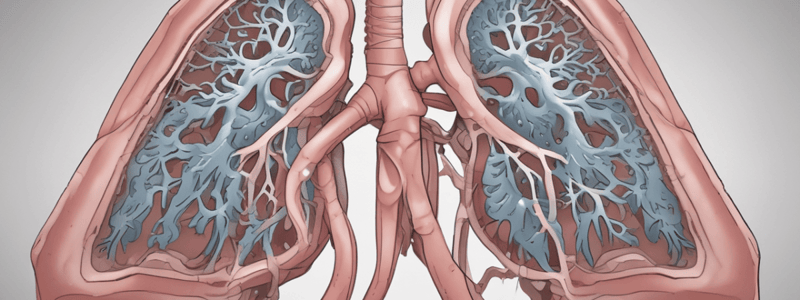Podcast
Questions and Answers
Which condition is characterized by fluid accumulation in the lungs, causing decreased gas exchange and severe respiratory distress?
Which condition is characterized by fluid accumulation in the lungs, causing decreased gas exchange and severe respiratory distress?
- Anaphylactic reaction
- Pulmonary edema (correct)
- Pneumothorax
- Pleural effusion
What is a common cause of COPD that is characterized by mucus buildup and airway obstruction?
What is a common cause of COPD that is characterized by mucus buildup and airway obstruction?
- Emphysema (correct)
- Pulmonary embolism
- Asthma
- Pneumothorax
Which condition involves bronchiole spasms, mucus production, and reversible airway obstruction?
Which condition involves bronchiole spasms, mucus production, and reversible airway obstruction?
- Asthma (correct)
- Chronic bronchitis
- Acute pulmonary edema
- Pneumothorax
What is a characteristic of cardiogenic pulmonary edema?
What is a characteristic of cardiogenic pulmonary edema?
Patients with COPD often experience which symptom(s)?
Patients with COPD often experience which symptom(s)?
What is the condition characterized by air accumulation in the pleural space, causing lung collapse?
What is the condition characterized by air accumulation in the pleural space, causing lung collapse?
Flashcards are hidden until you start studying
Study Notes
- Upper and lower airway infections can lead to obstructed airflow in larger airways, impairing gas exchange between alveoli and capillaries.
- Acute pulmonary edema results from fluid accumulation in the lungs, causing decreased gas exchange and severe respiratory distress.
- Causes of pulmonary edema include heart disease, smoke/toxic fume poisoning, chest injuries, exposure to high altitudes.
- Cardiogenic pulmonary edema presents with signs of a cardiac emergency, while non-cardiogenic cases are associated with factors like hypoxia, shock, trauma.
- Patients with COPD may have chronic bronchitis or emphysema, commonly caused by smoking and characterized by mucus buildup and airway obstruction.
- Patients with COPD often have a chronic cough, difficulty expelling air, and recurrent lung issues.
- Asthma involves bronchiole spasms, mucus production, and reversible airway obstruction, with severe cases requiring urgent treatment.
- Anaphylactic reactions can lead to severe airway swelling, respiratory distress, and potentially fatal outcomes.
- Pneumothorax is characterized by air accumulation in the pleural space, causing lung collapse, more common in tall, thin males.
- Pleural effusion involves fluid accumulation outside the lung, leading to sudden dyspnea and decreased breath sounds.
- Pulmonary embolism is a blood clot that blocks blood flow in the pulmonary artery, causing ventilation-perfusion mismatch and respiratory distress.
- Mechanical airway obstructions can result from foreign objects or improper head positioning, leading to dyspnea and unresponsiveness.
- Exposure to toxic substances like chlorine bleach or ammonia can cause upper airway irritation or lower airway damage like pulmonary edema.
- Cystic fibrosis is a genetic disorder affecting lungs and digestion, causing thick mucus secretions, breathing difficulties, and chronic infections.
Studying That Suits You
Use AI to generate personalized quizzes and flashcards to suit your learning preferences.




